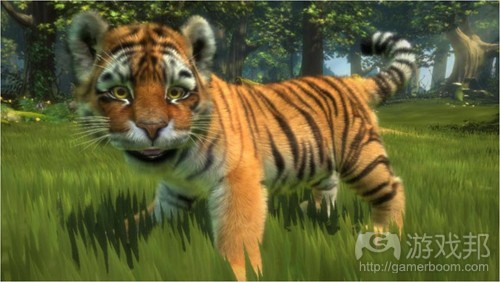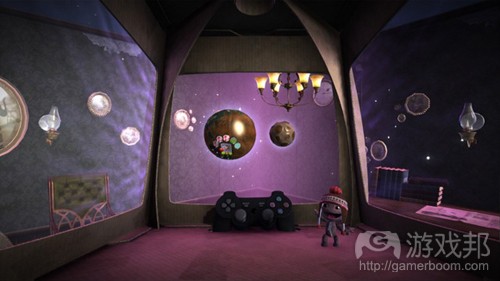- 浏览: 248762 次
- 性别:

- 来自: 杭州
-

文章分类
最新评论
-
nodonkey:
貌似还是不行,再等等吧,amfphp要出2.0了
amfphp1.9与php5.3.X版本不兼容 -
live711:
请问amfphp与php5.3.X搭配能用了吗?
amfphp1.9与php5.3.X版本不兼容 -
zhousheng193:
非常感谢!
安装flash player debug版本遇到的一些问题 -
sp42:
谢谢提示,我遇到的也是不能加密,用MAC地址代替之。
DI-624+A路由器韧体升级解决经常掉线的问题(转) -
心似海:
不错,要挖去了,哈哈
深入sql之merge into
作者:Tristan Donovan 成为一名狂热的游戏玩家是否就是进入开发者、设计师生涯的必要前提?或者开发者/设计师并不一定非是铁杆游戏玩家不可?来自id Software工作室的John Carmack、Media Molecule公司的Kareem Ettouney,以及Frontier Developments公司的David Braben等游戏行业元老针对这一话题发表了各自看法。 我们常可在游戏网站的招聘栏目看到“对电脑或视频游戏有浓厚的兴趣”、“具有体验多种游戏的激情,以及多年的游戏经验”,“专注于游戏文化”诸如此类的要求,满足了这些条件未必就能成功,但如果不达标就一定会落空。 由此来看,光有精湛的美工或编程技巧,一流的项目管理水平,或者音效制作才能并非通往这些企业的敲门砖,求职者还必须从骨子里流淌游戏玩家的血液。 但游戏开发团队中的每个人吃饭、睡觉、做梦甚至呼吸时,都应该无时不刻与游戏形影不离吗?当然有些开发者确实是把游戏融入了自己的生命。 这类开发者在暗室工作时接触游戏,在午餐的间歇也不忘再玩一把游戏,这听起来确实很老套,但有不少公司就是奉行“成为游戏开发者,必须先是贪婪的玩家”这种企业文化。 Frontier Developments(游戏邦注:该公司代表作包括《Kinectimals》)创始人David Braben认为,“开发者就应该玩游戏,我们之所以是开发者就是因为我们的本质就是游戏玩家。你见过制作电影但从来不爱看电影的人吗?” Stainless Games联合创始人Neil Barnden对此表示赞同,“玩游戏就是我工作之余的主要消遣方式,假如我不是在蹓狗或者摄影,那我就一定是坐在电脑前玩游戏,我觉得多数开发者的生活也大抵如此。” 这两者都认为开发者爱玩游戏有注于提高团队产品质量,据Barnden所称,“我发现凡是跟我一起共事的最有用处之人,基本上是那些不折不扣的资深玩家。他们涉猎广泛,只要看一眼游戏就能快速指导你应该这样或者那样操作,他们甚至能够畅谈5-10年前出品的游戏。不过现在有了YouTube,你不需要真正玩那款游戏,只要找到各种视频片段就晓得他们在谈哪款游戏。” 在Braben看来,团队成员拥有海量的游戏知识,可避免陷入开发仿制品的境地,“开发者对游戏文化了如指掌,并对其充满热爱这一点非常关键,否则他们很可能走上高产量而低质量的道路。” 另一家以原创性得名的工作室是索尼旗下的Media Molecule(游戏邦注:《小小大星球》开发商),但该工作室两名创始人——创意总监Mark Healey和美术总监Kareem Ettouney却并非眼里只有游戏的开发者。 Healey坦言自己对游戏有点无知,一般只会看高潮和最为知名的部分内容,而对其他东西却知之甚少。“这主要是因为我没有多少时间,我有一个年幼的儿子,另外就是我已经在电脑前坐一整天了,我不想一生都对着电脑,我希望生活和工作都要平衡一点。” 事实上,玩游戏从来不是激发他的动力,“在我有电脑之前,我总是对用电脑制作内容更感兴趣,但并不喜欢在电脑上消费内容”。 Ettouney称自己玩游戏主要是为了研究和调查,他更喜欢在空闲时间画画或者捣鼓音乐。“从艺术角度来讲,我喜欢找到作品的来源并直奔其出处。假如得到某些拥有强烈装饰艺术风格的游戏,我一般会直接去看它本身的装饰艺术来源而不是停留于这款游戏。这个世界有丰富的图像和文化资源,我觉得直接去获取这些内容更为有趣。” “也有一些出色的音乐家、作家实际上并不常与自己的工作内容粘在一块。我认为游戏开发领域也无需陷入制作游戏–玩游戏这种直线型的生活,你可以制作游戏,同时又喜欢功夫,后者其实有助于激发你的动画灵感,或者说你是一个舞者,你了解高雅的内涵,但并不一定需要知识渊博。” 最重要的是,开发团队中的其他成员已经拥有深度的游戏知识,“我们需要这些成员,也吸收了一些对游戏领域的知识如数家珍的人才,他们可以让我们获得启发。”Healey也同意Ettouney的这种看法,并称Media Molecule团队也有一些这种“通才”,所以大家可以形成互补。 Ettouney称Media Molecule是一家极为重视实验的工作室,“我们所有成员都拥护原创,索尼的运营理念就是最先发行游戏,或者发行最好的游戏。假如你想制作出另一款《杀戮地带》,当然要有好心态和广博的知识,但因为我们重视原创和实验,所以这种知识对我们来讲也并非十分重要。” id Software的John Carmack也赞同工作与生活要保持平衡的看法,“我现在有一个6岁的儿子,一般是跟儿子一块玩Wii和DS游戏,我玩过一点《使命召唤》,但没有通关。” Carmack最近比较关注开发技术而非游戏设计,“实际上我并不是最擅长设计游戏,我会设计一些简单的游戏。我想我最拿手的是用户交互方式等一些低级别的设计元素。但在整款游戏的用户体验方面,我并不是最擅长此道的人。我最感兴趣的还是编程工作,这也正是现在的游戏无法由三人小团队开发完成的原因,现在的游戏需要更多人手才能完工。” 持有相同看法的id工作室成员并不只有Carmack一人,“我们工作室有些编程人员主要角色是工程师而非游戏玩家,但这并不妨碍他们最后制作出令人引以为豪的内容。我认识一些喜欢解决抽象问题的程序员,但他们并不是我想吸收的成员。我想聘请一些真的想制作好产品,希望推出有价值的内容这种人员。” 他的看法是,“(游戏开发工作)这可不只是上下班打打卡,你得拥有一定信念,成为开发过程的一部分,制作有可能在全球被体验上千万个小时的游戏。” 加拿大游戏行业招聘机构3pod总裁Frédérick Brassard认为,受创造力驱动的开发者将比热爱游戏的开发者更为普遍,原因就在于:技术短缺。“在目前这个行业中,我们有些职位经常空缺,有些职位经常需要急 聘,结果就造成一些游戏公司对非游戏玩家更为宽容,也愿意向他们敞开大门。技术鸿沟几乎成了设计、编程和美工等各个游戏部门的常见问题。” 除了技术短缺的现象,以及非游戏玩家的短板可由其他成员抵消等原因促使更多公司招聘这类成员之外,还有什么因素导致这些公司做出这一抉择?他们吸收这类并不把游戏当爱好的成员有何好处? Healey的回答是,“这种做法有一种积极作用,那就是这种人不会过度受到游戏的影响和局限。他们可以保持一种新鲜感,以及孩童般的好奇心,制作出更令人耳目一新的东西。想想看在电脑游戏问世之前,首先制作出这些游戏的人之前从来也没见过电脑游戏长啥样,所以这种做法可以让团队保持创新性。” 但Braben对这种说法表示怀疑,“作为一名非游戏玩家的开发者真有什么优势吗?我认为对设计师来讲几乎没有多大裨益。也许他们可以打破常规,不受他人行为的影响,这一点确实不赖。但问题在于,你可能会因为知之甚少,落后于潮流而制作出人们早在多年前就已经推出的游戏。” 他以人们对第一人称射击游戏的控制方式达成共识一事为例,指出开发者,尤其是设计师必须了解游戏,“假如有人过来添乱并搅乱了游戏,玩家就会非常不快,所以你必须了解玩家的这种感受。” 世嘉游戏《恶梦来袭》制作人Satoshi Ito认为,就算开发者必须是铁杆玩家,也同样需要注意玩游戏不可过多过滥,“如果你玩了太多游戏,或者被动地玩游戏,那就只会沦为另一名用户,彻底变成一名玩家而已。你在玩游戏过程中应该保持批判性思维,想想游戏有哪些出彩之处,为何会有趣,它后面的设计和概念是什么,游戏的目标是什么?这些都是开发者在玩游戏过程中需牢记在心的内容。”(本文为游戏邦/gamerboom.com编译,如需转载请联系:游戏邦) To Play Or Not To Play? by Tristan Donovan [Developers, including id's John Carmack, Media Molecule's Kareem Ettouney, and Frontier Developments' David Braben debate on whether developers should be obsessive gamers -- or remain outside of the influence of other titles.] “A strong interest in computer or video games”, “a passion for playing games from multiple genres and over many years”, “be part of a culture dedicated to gaming”. These are just a selection of the qualities sought from applicants to recent game development job adverts on Gamasutra. These aren’t desirables, but must-have requirements. Anyone without these qualities need not apply. It seems that it is not enough to be a great artist, a master programmer, a first-rate manager, or an audio wizard; you need to have the very word gamer etched through you like a living stick of rock. But is it really necessary for everyone on a development team to eat, sleep, dream, and breathe games as well as devote their working life to them? Certainly there’s a romantic idea of the game developer who devotes their life to gaming. Living in crunch mode, working in a darkened room, and using their lunch breaks to get another fix of gaming. Stereotype that may be, but many in the game industry do hold the view that to be a game maker you must also be an insatiable gamer. “Developers should play games,” says David Braben, founder of Frontier Developments (Kinectimals) and an avid player outside of work. “The reason they become developers should be because they are gamers. Would you expect someone making films to not have any love or appreciation of films? It would be barmy.” Neil Barnden, co-founder of Stainless Games (Magic: The Gathering – Duels of the Planeswalkers 2012), echoes the sentiment: “It is my main pastime outside of work. If I’m not walking the dog or taking photographs, I’m probably back in front of my screen playing something, and I’d say that for the majority of people here it would be the same.” Both Braben and Barnden see that kind of dedication to gaming among developers as having clear benefits for the quality of the work a team produces. “I’ve always found the most useful people I have worked with have been the ones who are just fanatical gamers, who play all sorts of stuff, and can instantly look at a game, and say, ‘You need to look at so-and-so’,” says Barnden. “They may be talking about a game that was made five to 10 years ago, but it did something particularly well — and thanks to YouTube, you don’t even have to play it. You can just go and find various clips that show what they were talking about.” Braben sees having staff with an encyclopedic knowledge of games as a powerful defense against me-too development. “It is vital for developers to have a thorough familiarity with games and to have a love for games; otherwise they will produce games by numbers, and I think there is some of that around,” he says. One studio that couldn’t be accused of lacking in originality is Media Molecule, the Sony-owned studio behind the LittleBigPlanet games. But it turns out that two of its founders — creative director Mark Healey and art director Kareem Ettouney — are anything but obsessive gamers. “I think I’m a bit ignorant to be honest,” admits Healey. “I get to see the highlights, the things that are quite well known, but there’s a bunch of stuff out there I don’t have a clue about, to be honest. It’s mainly about time with me, especially now I have a little boy. There’s also the fact that you’re sitting at a desk all day looking at a screen and you don’t really want to look at a screen for all of your life. It is good to get a bit of balance in there.” In fact, playing games has never been a motivation. “Even before I had a computer, I was more interested in the idea of making things with it than consuming things on it,” he says. Ettouney describes his playing as being mainly in the name of research, and prefers to spend his free time painting or playing music. “Artistically, I like to look at everything and to go to the source. You get games, for example, that have a very strong Art Deco feel, but instead of being inspired by that game I like to look at Art Deco itself. There is so much wealth of imagery and culture out there that it is nice to connect with it directly,” he says. “There are people who are great musicians and great writers and great storytellers who don’t necessarily play much. I think that things that feed into development do not have to be direct. You don’t have to make games and then play games — you can make games and do kung fu and that will help your animation, or if you’re a dancer, you understand elegance. It doesn’t have to be literal.” What’s important is that others on the team do have that in-depth knowledge of gaming, Ettouney says. “We need those people. We’ve got people in the team who are fluent in all the on-going stuff and they show us as well.” Healey agrees: “There are people within Media Molecule who cover that range, so it’s fine — we’re not completely in a bubble, but it’s nice to have people who aren’t completely immersed in that world.” That Media Molecule is a studio with a heavy focus on experimentation also helps. “All of us at Media Molecule are united by originality,” says Ettouney. “Sony’s philosophy is to publish games that are either the first or the best of their kind. The best mentality definitely requires that in-depth knowledge, if you’re going to do another Killzone for example. But because we are very interested in the original, experimental side, that knowledge is not quite as important.” Balance within the team is also important for John Carmack of id Software. “Now I’ve got a six-year-old son, all the video games that I actually play tend to be Wii and DS games with my son,” he says. “I play a bit of Call of Duty, but I didn’t play it all the way through.” These days Carmack focuses on developing the technology behind id’s games rather than getting involved in design decisions. “It would be bad for me to go in and be making design decisions by fiat, as I don’t feel I’m the strongest,” he says. “I have some ability at design on simple games. The low-level elements of design such as the user interaction, I still think I’ve got a pretty good handle on all of that. “But the larger production of crafting the user experience through the entire title and what people expect from different things? I’m not the best person to do that. I’m fully engaged with my programming tasks. That’s why games aren’t done by three people anymore — you need more people than that.” He’s also not the only employee at id that doesn’t fit the gamer-developer stereotype. “There are a few people on the programming side that are more engineer than gamer, but there’s still this pride in product at the end,” says Carmack. “I know some programmers that like working on abstract problems and, in general, those aren’t the people I want to hire. I want to hire the people that really want to make a product, and want to produce something of value. “It’s not just you’re here doing your job, punching a clock. You’re part of the creed, part of the process and you’re building something that is hopefully going to have millions of hours of game play across the world,” he says. And game developers who are driven primarily by the act of creation rather than a love of playing games is something that may become more common, according to Frédérick Brassard, president of the Canada-based game industry recruitment agency 3pod. The reason? Skills shortages. “Right now in the industry, we have major needs and major emergencies concerning some positions,” he explains. “The consequence of this is that sometimes games companies are more open than before to allowing non-gamers into the company. The skills gap is in almost every area right now: design, programming, and art.” But even if skills shortages force game companies to become less fussy about the gaming habits of their recruits and those less interested in playing games are counterbalanced by other team members, are there any advantages to having staff who don’t count playing games as a hobby? Healey is convinced there are: “There’s a positive side to it, in that you are not too influenced. You have a naivety, a childish naivety that can let you do something really exciting. Think back to when computer games were new. The people making those games had no games to look to, and so there was a lot of innovation happening then.” Braben remains skeptical that such naivety is useful: “Are there advantages to not being a regular player of games? I would say among designers, probably not. It may be that they come at it fresh and not be influenced by the way people have done things, which actually is a fair point. But the problem is you will end up more likely than not just doing something in a game that was done umpteen years ago.” He points to the way that there now exists a consensus on how the controls of a first-person shooter operate. It is, he says, a good example of why developers, and designers especially, must know their games. “If someone comes along and messes with them just for messing with them’s sake, players would be quite annoyed,” he says. “You do need to know where the players are coming from.” But even when developers are dedicated players, there’s a balance to be struck, says Satoshi Ito, producer of Sega’s Rise of Nightmares. “It is very important for developers to play games, but they shouldn’t be playing too much, and it also depends on their approach when they play,” he says. “If you play too much, or if you play passively, you become just another customer — just a player. You have to be always thinking critically when you are playing games. You should be thinking about what are the special things that have been done to make this game interesting, what are the designs and concepts behind it, and what are the things they are trying to achieve? These are some of things you should bear in mind when playing games as a developer.”(source:gamasutra)







相关推荐
在市场策略上,英特尔对游戏本市场进行了细致划分,推出了针对不同需求的骨灰级发烧性能、轻薄级发烧性能、主流级轻薄性能以及主流级性能的产品,以满足不同游戏玩家的偏好。英特尔还积极与游戏开发者、引擎厂商和...
贪吃蛇游戏是一个简单却富有挑战性的游戏,玩家需要控制一条蛇在屏幕上移动,吃到食物后蛇会变长,碰到边界或自己的身体则游戏结束。 【描述】: "仅供学习使用" 这个项目主要是为了教学目的,通过实践来帮助学习者...
Tim Sweeney为大家讲述重塑移动硬件的潮流和展望游戏发展前景。具体包括:Epic Games对未来移动硬件性能和特色的新希望;骨灰级移动游戏玩家群体的出现;移动游戏开发 团队的规模、预算和技术需求。
对于那些追求极致游戏体验的骨灰级玩家和对画面质量有高要求的用户,可能需要全面升级硬件配置,包括CPU、主板、显卡等,以达到理想的效果。总的来说,理解自己的需求,正确识别问题,有针对性地升级硬件,是提升...
对于多人在线游戏,Unity支持UNET网络框架,实现玩家同步、数据通信等功能。不过,Unity 2019后,UNET已被淘汰,推荐使用Mirror或 Photon 等第三方库。 11. **发布与部署**: Unity支持多平台发布,包括Windows、...
4. **游戏算法**:在某些游戏中,树状数组可以用于动态维护玩家的状态,如积分、等级等,支持快速的增减和区间查询。 5. **图形学**:在图形处理中,树状数组可以用来统计像素的颜色分布,加速光照计算等。 树状...